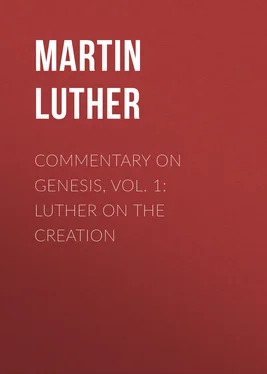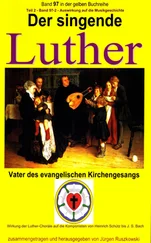Martin Luther - Commentary on Genesis, Vol. 1 - Luther on the Creation
Здесь есть возможность читать онлайн «Martin Luther - Commentary on Genesis, Vol. 1 - Luther on the Creation» — ознакомительный отрывок электронной книги совершенно бесплатно, а после прочтения отрывка купить полную версию. В некоторых случаях можно слушать аудио, скачать через торрент в формате fb2 и присутствует краткое содержание. Жанр: foreign_prose, foreign_religion, Философия, foreign_psychology, foreign_antique, на немецком языке. Описание произведения, (предисловие) а так же отзывы посетителей доступны на портале библиотеки ЛибКат.
- Название:Commentary on Genesis, Vol. 1: Luther on the Creation
- Автор:
- Жанр:
- Год:неизвестен
- ISBN:нет данных
- Рейтинг книги:4 / 5. Голосов: 1
-
Избранное:Добавить в избранное
- Отзывы:
-
Ваша оценка:
- 80
- 1
- 2
- 3
- 4
- 5
Commentary on Genesis, Vol. 1: Luther on the Creation: краткое содержание, описание и аннотация
Предлагаем к чтению аннотацию, описание, краткое содержание или предисловие (зависит от того, что написал сам автор книги «Commentary on Genesis, Vol. 1: Luther on the Creation»). Если вы не нашли необходимую информацию о книге — напишите в комментариях, мы постараемся отыскать её.
Commentary on Genesis, Vol. 1: Luther on the Creation — читать онлайн ознакомительный отрывок
Ниже представлен текст книги, разбитый по страницам. Система сохранения места последней прочитанной страницы, позволяет с удобством читать онлайн бесплатно книгу «Commentary on Genesis, Vol. 1: Luther on the Creation», без необходимости каждый раз заново искать на чём Вы остановились. Поставьте закладку, и сможете в любой момент перейти на страницу, на которой закончили чтение.
Интервал:
Закладка:
The meaning of Moses therefore in all simplicity is that all things which now exist were created by God and that "in the beginning" of the first day were created the mass of mud or of earth, and of dark mist or of water; on which afterwards, in the after part of the first day, God shed the light and caused the day to appear, which might discover this rude mass of "the heavens and the earth;" which was in all respects like undeveloped seed, and yet adapted to produce whatever God should require.
V. 2a. And the earth was waste and void.
In the Hebrew words TOHU and BOHU there is no more meaning than can be expressed in any other language, yet these terms are frequently used in the sacred Scriptures. TOHU means "nothing," so that a TOHU earth means, in its simple reality, that which is in itself "empty" or "waste;" where there is no way, no distinction of places, no hill, no vale, no grass, no herbs, no animals, no men. And such was the first appearance of the waste and untilled earth, for while the water was mixed with the earth no distinctions of those various objects could be discerned, which are clearly seen since the earth's formation and cultivation.
Thus Isaiah, 34:11, when threatening destruction to the whole earth says "There shall be stretched upon it the line of TOHU, confusion; and the plummet of BOHU, emptiness;" that is, it shall be made so desolate that neither men nor beasts shall be left upon it; all houses shall he devastated and all things hurled into chaos and confusion. Just as Jerusalem was afterwards laid waste by the Romans and Rome by the Goths, so that no vestige of the ancient city as it once was could be pointed out. You now behold the earth standing out of the waters, the heavens adorned with stars, the fields with trees, and cities with houses; but should all these things be taken away and hurled into confusion and into one chaotic heap, the state of things thus produced would be what Moses calls TOHU and BOHU.
As the earth was surrounded with darkness or with waters over which darkness brooded, so also the heaven was unformed. It was not only TOHU because it was destitute of the garnishing of the stars, and BOHU because it was not yet separated and distinguished from the earth, but because it was as yet altogether destitute of light and a dark and deep abyss which like a dense cloud enveloped the earth, or that mass of mud; for the division of the waters from the waters follows later.
Here then we have the first thing which Moses teaches: that the heavens and the earth were created on the first day; but, that the heaven was as yet unformed, not separated from the waters, destitute of its luminaries, and not elevated to its position; and the earth in like manner was as yet without its animals, its rivers and its mountains.
As to Lyra's argument that this original matter was mere power and was afterward rendered substance by its own power, or as to what Augustine says in his book of "Confessions," that matter is as it were nothing, and that no medium matter can be thought of between the Creator and the thing created; such subtle disquisitions I by no means approve. For how could that be a mere nothing which was already of such material and substance that Moses calls it "the heavens and the earth"? Unless indeed you would call it artificially the same kind of matter which you call wood, which is not yet wrought into a chest or a bench. But this latter substance is what true philosophers would call matter in a secondary state.
We should rather consider the whole subject, as Peter considers it, 2 Pet. 3:5, where speaking of the wicked, he says "For this they wilfully forget, that there were heavens from of old, and an earth compacted out of water and amidst water, by the word of God; by which means the world that then was, being overflowed with water, perished." For Peter seems to intimate that the earth consists of water, and was made out of water, and that after it was produced out of water and placed as it were in the light, it swam as it now seems to do in the water. This, says he, the wicked knew, and therefore being confident of this condition of things, they feared no peril from water, which they knew to be the fundamental substance of the earth. Yet the water destroyed that earth which it preserved, buoyed up and bore; just as at the last it shall be destroyed by fire. From this intimation of Peter, it would appear, that the earth was made to stand in the water, and out of the water. But let this suffice concerning the original matter or material. If any one should discuss the subject with greater subtlety of argument, I do not think he would do so, with any profit.
V. 2b. And darkness was upon the face of the deep.
The "water," the "deep," and the "heavens," are here put for the same thing; namely, for that dark unformed substance which afterwards was divided by the Word. For it was the office of the second Person of the Trinity, namely Christ, the Son of God, to divide and adorn that chaotic mass produced from nothing. And this may have been the very design of Moses in not mentioning the Word in the first place; that is, in not saying at first, "And God said." For some maintain that this was done by Moses purposely.
V. 2c. And the Spirit of God moved upon the face of the waters.
Some consider "the Spirit of God" here to mean merely the wind. But if anything material is here to be understood by "Spirit," I should rather refer it to the first moving of the original unformed mass of heaven and earth, which is called "the deep," which is always in motion to this day; for water is never still, its surface is always in motion. But I prefer here to understand the Holy Spirit. For the wind is a creature which did not exist, while as yet the heavens and the earth lay in that confused chaotic mass.
There is moreover an universal agreement of the Christian Church concerning a revelation of the mystery of the Holy Trinity in this first creative work. The Father through the Son, whom Moses here calls the Word, creates "the heavens and the earth" out of nothing. Over these the Holy Spirit broods. And as a hen sits upon her eggs that she may hatch her young, thus warming her eggs and as it were infusing into them animation, so the Scriptures say the Holy Ghost brooded as it were on the waters; that He might infuse life into these elementary substances which were afterwards to be animated and garnished. For the office of the Holy Spirit is to give life.
These explanations, as far as I see, are sufficient for our present purpose. Wherefore casting away all other diverse opinions, let us set down this as the truth, that God created "the heavens and the earth," as yet a rude mass, out of nothing; so that the earth, as an unformed chaotic mass, enveloped the heaven as yet also an unformed mass, like a dark, circumfluent, nebulous cloud.
It is necessary however that we discuss the terms here used. At the very beginning of this discussion we are met by the expression "In the beginning." Some have expounded the words "In the beginning" as meaning "In the Son," from John 1:1; seeing that Christ also gives to the Jews when they inquired "who He was?" this answer, "The beginning, who also speak unto you," John 8:25. This same exposition is given also from Ps. 110:3, "With thee is the Beginning, in the day of thy power;" which passage nearly all commentators expound as meaning, "With thee is thy Son in divine power." But it is well known to those acquainted with the Greek language that the expression tan Archan should be rendered by an adverbial phraseology "at first" or "in the beginning," etc. It is a figure of speech which we frequently meet in Greek. Wherefore let those who will, amuse themselves by thus interpreting the expression "In the beginning." I prefer the simplest explanation which can be at once understood by the less learned.
Читать дальшеИнтервал:
Закладка:
Похожие книги на «Commentary on Genesis, Vol. 1: Luther on the Creation»
Представляем Вашему вниманию похожие книги на «Commentary on Genesis, Vol. 1: Luther on the Creation» списком для выбора. Мы отобрали схожую по названию и смыслу литературу в надежде предоставить читателям больше вариантов отыскать новые, интересные, ещё непрочитанные произведения.
Обсуждение, отзывы о книге «Commentary on Genesis, Vol. 1: Luther on the Creation» и просто собственные мнения читателей. Оставьте ваши комментарии, напишите, что Вы думаете о произведении, его смысле или главных героях. Укажите что конкретно понравилось, а что нет, и почему Вы так считаете.












